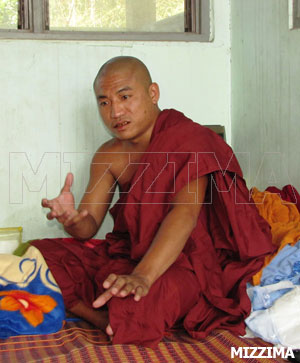Ashin Gambira, one of the leaders of the “Saffron Revolution” in 2007, was removed from his monastery by authorities in Rangoon on Friday.
 A fellow monk told CNN that around 10 men in plain clothes took Gambira away in a car. He said the men told him that Gambira was not under arrest, but he was wanted for questioning.
A fellow monk told CNN that around 10 men in plain clothes took Gambira away in a car. He said the men told him that Gambira was not under arrest, but he was wanted for questioning.
A leader of the All-Burmese Monks Alliance who was serving 68 years in prison before his release in January in an amnesty, Gambira may have been arrested because he tried to enter monasteries that were closed and locked by the military regime following the monk-led street protests in 2007, said a fellow monk.
According to Agence France Presse, Gambira was being questioned for “breaching regulations.”
The officials were from the government religious authority department and Rangoon division government, said AFP.
After he was freed last month, Gambira had reportedly been trying to reopen monasteries that were closed and locked up by the authorities.
“He was taken this morning from his monastery for questioning because he broke the locks of three monasteries since his release,” an anonymous source told AFP.
In many interviews after his release, Gambira said he did not trust the democratic reforms that have taken place during the past year.
The 31-year-old monk was arrested in November 2007 after the street protests. Three weeks later, he was jailed for 68 years.
He was one of about 600 people freed in January in an amnesty directed toward national reconciliation and encouraging the lifting of sanctions imposed by the European Union and the United States.
Since his release, Gambira had moved in to Meggin Monastery in Rangoon with hopes of rebuilding the monastery that was destroyed by the military regime following the 2007 demonstrations. The monastery’s monks were beaten and many were imprisoned. It is one of more than 60 monasteries that were raided, closed, and destroyed during the crackdown following the protests.
Gambira said in a recent interview that the government still must apologize to the Buddhist sangha for its actions against monks.
“The government has transformed its external appearance into a civilian one, but their efforts to implement democracy are still rather weak, while many cases of human rights violations continue,” he was quoted as saying.


